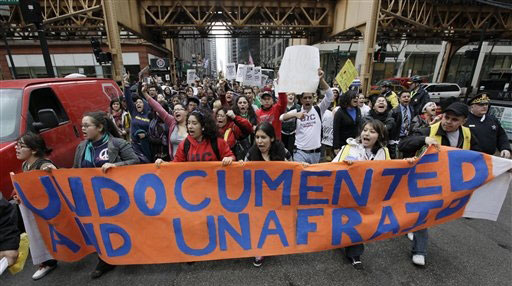
New plans for “sealing” the border between Mexico and the U.S., insisted on by Republicans as a condition for their support of immigration reform, do nothing to deal with the root causes of undocumented immigration and are doomed to fail, while increasing suffering and deaths at the border.
The right has portrayed undocumented immigration as an “invasion” of revolutionaries and criminals, orchestrated by the Mexican government; this is nonsense.
The reasons behind labor immigration from Latin America and the Caribbean are eloquently presented by Puerto Rican journalist and historian Juan Gonzalez in his book “Harvest of Empire: A History of Latinos in America (Revised edition 2011, Penguin),” and in other studies.
Successive U.S. military interventions in Latin America have had a major influence in stimulating mass immigration to the U.S. The 1954 overthrow of the progressive elected government of Guatemalan President Jacobo Arbenz by the Eisenhower administration, motivated by a desire to protect the interests of the United Fruit Company, led to a civil war that lasted until the 1990s and killed more than 200,000 people, most at the hands of the U.S. allied military and right-wing death squads.
Thousands fled across the border into Mexico and some ended up in the U.S. The continuing social instability created by the war combines with economic factors to stimulate current Guatemalan immigration.
The Contra War in Nicaragua, in which the U.S. teamed up with right-wing death squads to overthrow the left-wing Sandinista government, forced many to leave. In El Salvador, U.S. allied troops and paramilitaries created another bloodbath. Ironically, there was really nowhere for people to go except to the U.S. itself. U.S. support for the Salvadoran ultra-right, including vicious death squads, also meant that there was no way that Salvadorans refugees could get legally recognized as such. So like the others, they came in “undocumented.”
In the Dominican Republic, the U.S. supported dictator Rafael Leonidas Trujillo for many years. When he was finally overthrown (with CIA help), the U.S. worked to prevent the coming to power of a left-wing government. In 1965, Lyndon Johnson sent troops to squash a left-wing uprising from restoring the legally elected president, Juan Bosch, who had been overthrown by the military. The return of repressive right-wing rule led to increased emigration of Dominicans, mostly to New York.
In Haiti, the U.S. supported right-wing, repressive governments for many years. In 1994 the Clinton administration helped to restore the legally elected president, Jean Bertrand Aristide, to power. However, this came with a price: Aristide had to agree to unfavorable trade arrangements which enriched the U.S. rice industry while undercutting Haitian rice growers. In 2004, the Bush administration connived with France, Canada, and the Haitian elites to overthrow Aristide again, after he had called for France to pay reparations for harm to the Haitian economy in the 19th century. Again people fled, many to the U.S.
Accompanying all of these interventions is the factor of unequal trade relations.
Starting from before the initiation of the North American Free Trade Agreement (NAFTA) among the U.S., Mexico, and Canada in 1994, and the subsequent Central America-Dominican Republic Free Trade Agreement (CAFTA-DR) all the countries of the region except Cuba were squeezed into trade deals that highly favor transnational corporations and undercut the position of workers, small farmers and small scale businesses.
In Mexico, several million grain farmers have been driven off the land by unfair competition from U.S. and Canadian agribusiness. Jobs that were supposed to materialize in other areas of the Mexican economy have not. Claims in the U.S. media that immigration from Mexico is down because Mexico is no longer poor should be taken with a grain of salt. In many villages and small towns in Mexico, there are virtually no young men left who could migrate, and remaining inhabitants live on the $24 billion which Mexican immigrants in the U.S. send back to them every year.
There are increases in undocumented immigration from Guatemala, Honduras, and El Salvador, in spite of publicity about the fact that drug trafficking gangs are now waylaying immigrants on their way through Mexico to the United States, kidnapping them for ransom and sometimes murdering them.
People who are willing to risk these depredations are not going to be deterred by a wall, especially if they already have spouses and children in the U.S. to whom they are trying to return. They will rely even more on immigrant smugglers, increasingly controlled by the criminal gangs, to bring them through even more dangerous border areas, where more and more immigrants are dying every year.
Nor will they respond to losing their jobs because of E-verify; they will end up working for less money under worse conditions, for cash under the table.
The U.S. should recognize its own role in undocumented immigration, and make available sufficient numbers of legal immigrant visas (green cards, not temporary worker visas) to eliminate the “illegal” part. If it does not want this mass labor immigration at all, it should radically change its relationship with neighboring countries. This would mean no more C.I.A., no more subsidies to right-wing political groups, and no more efforts to protect U.S. corporate interests at the expense of millions of ordinary people in Latin America and the Caribbean.
None of the Republican politicians, and only a few of Democrats, are even able to grasp this. Therefore, those who want to see progressive immigration reform without undesirable “trade-offs” and concessions have to also work for a change in U.S. international policy.
I’m not saying that will be easy.
Photo: “Undocumented and Unafraid,” reads a sign held by demonstrators rallying for immigration reform. M. Spencer Green/AP










